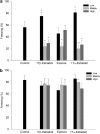Low doses of 17alpha-estradiol and 17beta-estradiol facilitate, whereas higher doses of estrone and 17alpha- and 17beta-estradiol impair, contextual fear conditioning in adult female rats
- PMID: 19847162
- PMCID: PMC3055382
- DOI: 10.1038/npp.2009.161
Low doses of 17alpha-estradiol and 17beta-estradiol facilitate, whereas higher doses of estrone and 17alpha- and 17beta-estradiol impair, contextual fear conditioning in adult female rats
Abstract
Estrogens are known to exert significant structural and functional effects in the hippocampus of adult rodents. In particular, 17beta-estradiol can improve, impair, or have no effect on hippocampus-dependent learning and memory depending on dose and time of administration. The effects of other forms of estrogen, such as estrone and 17alpha-estradiol, on hippocampus-dependent learning have not been as thoroughly investigated. Therefore, the purpose of this study was to investigate the effects of 17beta-estradiol, estrone, and 17alpha-estradiol at three different doses on two different tasks: hippocampus-dependent contextual fear conditioning and hippocampus-independent cued fear conditioning. Adult ovariectomized female rats were injected with one of the estrogens at one of the three doses 30 mins before conditioning to assess the rapid effects of these estrogens on acquisition. Twenty-four hours later memory for the context was examined and 1 h later memory for the cue (tone) was assessed. Levels of synaptophysin were examined in the dorsal hippocampus of rats to identify a potential synaptic correlate of hormonal effects on contextual fear conditioning. Low 17beta-estradiol and 17alpha-estradiol enhanced, whereas high 17beta-estradiol and 17alpha-estradiol impaired, contextual fear conditioning. Only the middle dose of estrone severely impaired contextual fear conditioning. Estrogens did not alter performance in the hippocampus-independent cued task. Synaptophysin expression was increased by estrone (at a middle and high dose) and 17beta-estradiol (at a middle dose) in the CA3 region of the hippocampus and was not correlated with cognition. The results of this study indicate that estradiol can positively or negatively influence hippocampus-dependent learning and memory, whereas estrone impairs hippocampus-dependent learning and memory in a dose-dependent manner. These results have important therapeutic implications, as estrone, a main component of a widely used hormone replacement therapy, was shown to have either a negative effect or no effect on learning and memory. It may be possible to use 17alpha-estradiol and lower doses of estrogens as potential alternatives in hormone replacement therapies.
Figures



References
-
- Acosta JI, Mayer L, Talboom JS, Zay C, Scheldrup M, Castillo J, et al. Premarin improves memory, prevents scopolamine-induced amnesia and increases number of basal forebrain choline acetyltransferase positive cells in middle-aged surgically menopausal rats. Horm Behav. 2009;55:454–464. - PMC - PubMed
-
- Altemus M, Conrad CD, Dolan S, McEwen BS. Estrogen reduces fear conditioning: differential effects on tone vs contextual conditioning. Biol Psychiatr. 1998;43:14S.
-
- Barha CK, Lieblich SE, Galea LA. Different forms of oestrogen rapidly upregulate cell proliferation in the dentate gyrus of adult female rats. J Neuroendocrinol. 2009;21:155–166. - PubMed
-
- Barrientos RM, O'Reilly RC, Rudy JW. Memory for context is impaired by injecting anisomycin into dorsal hippocampus following context exploration. Behav Brain Res. 2002;134:299–306. - PubMed
-
- Berry B, McMahan R, Gallagher M. Spatial learning and memory at defined points of the estrous cycle: effects of performance on a hippocampal-dependent task. Behav Neurosci. 1997;111:267–274. - PubMed
Publication types
MeSH terms
Substances
LinkOut - more resources
Full Text Sources
Miscellaneous

